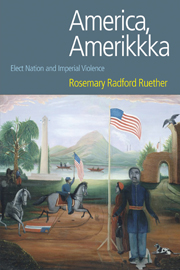Book contents
- Frontmatter
- Dedication
- Contents
- Introduction: THE TWO FACES OF AMERICA: THE IDEAL AMERICA AS DECEPTION AND AS PROTEST
- Chapter One ELECT NATIONS OF EUROPE AND THE MAKING OF THE AMERICAN MYTH OF CHOSENNESS
- Chapter Two THE RIGHTS OF MAN AND THE EXCLUDED OTHERS — THE REVOLUTIONARY ERA AND BEYOND
- Chapter Three MANIFEST DESTINY AND ANGLO-SAXON RACISM — 1815-1875
- Chapter Four MANIFEST DESTINY AND AMERICAN EMPIRE: 1890-1934
- Chapter Five AMERICA'S GLOBAL MISSION: THE COLD WAR ERA, 1945-89
- Chapter Six AMERICAN EMPIRE AND ITS DENOUEMENT: 1990-2007
- Chapter Seven ALTERNATIVE VISIONS OF AMERICA: THE PROTEST TRADITION
- Chapter Eight TOWARD A U.S. THEOLOGY OF LIBERATION AND LETTING GO
- BIBLIOGRAPHY
- INDEX OF BIBLICAL REFERENCES
- GENERAL INDEX
Chapter Six - AMERICAN EMPIRE AND ITS DENOUEMENT: 1990-2007
- Frontmatter
- Dedication
- Contents
- Introduction: THE TWO FACES OF AMERICA: THE IDEAL AMERICA AS DECEPTION AND AS PROTEST
- Chapter One ELECT NATIONS OF EUROPE AND THE MAKING OF THE AMERICAN MYTH OF CHOSENNESS
- Chapter Two THE RIGHTS OF MAN AND THE EXCLUDED OTHERS — THE REVOLUTIONARY ERA AND BEYOND
- Chapter Three MANIFEST DESTINY AND ANGLO-SAXON RACISM — 1815-1875
- Chapter Four MANIFEST DESTINY AND AMERICAN EMPIRE: 1890-1934
- Chapter Five AMERICA'S GLOBAL MISSION: THE COLD WAR ERA, 1945-89
- Chapter Six AMERICAN EMPIRE AND ITS DENOUEMENT: 1990-2007
- Chapter Seven ALTERNATIVE VISIONS OF AMERICA: THE PROTEST TRADITION
- Chapter Eight TOWARD A U.S. THEOLOGY OF LIBERATION AND LETTING GO
- BIBLIOGRAPHY
- INDEX OF BIBLICAL REFERENCES
- GENERAL INDEX
Summary
For military and political leaders shaped by forty years of Cold War with its polarization of the world into the spheres of ‘freedom’ and ‘tyranny,’ the collapse of the Soviet Union was both unsettling and unwelcome, despite the rapidity with which they claimed an American ‘victory’ won through unrelenting economic and military pressure on the ‘enemy.’ In order to avert the ‘threat’ of a ‘peace dividend,’ with its demands for a scaling down of the American military in favor of rebuilding social services at home and responding to social needs abroad, new enemies needed to be found that could be defined as equally dangerous to that of the former USSR and hence demanding equivalent global American military and police power. In a revelatory moment, Chairman of the Joint Chief of Staffs Colin Powell quipped, ‘I'm running out of demons. I'm running out of villains. I'm down to Castro and Kim Il Sung.’
New Demands for Military Expansion
During the George H.W. Bush Administration in the early 1990s military planners were at work crafting a new rationale for U.S. military expansion post-Cold War. Early in 1992, Paul Wolfowitz, then undersecretary of Defense for Policy, circulated a draft of the current Defense Planning Guide which frankly acknowledged that America was now the sole superpower and should shape its defense planning to assure its permanent preeminence over the entire globe, not only defeating existing competitors for global power, but projecting such overwhelming power that any potential competitors would be convinced that ‘they need not aspire to a greater role or pursue a more aggressive posture to protect their legitimate interests.’
- Type
- Chapter
- Information
- America AmerikkkaElect Nation and Imperial Violence, pp. 173 - 210Publisher: Acumen PublishingPrint publication year: 2007



